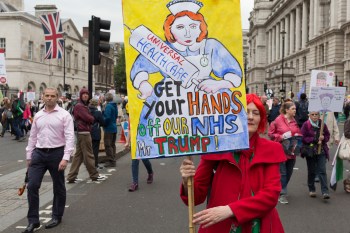Britain has its health care problems, too
TEXT OF STORY
Kai Ryssdal: Lots of Americans complain about complain about the rising cost of health care. Nothing new there.
It’s in the solutions, though, that people differ. Some want single-payer, some want a market solution. Some want a system like they have over in Britain, where the National Health Service offers care for free. Or at least it’s funded by the taxpayer to the tune of almost $200 billion a year.
But the NHS has its problems. Long waits for certain procedures. And poor-quality care sometimes. Which has prompted calls for the NHS to lower its sights. From London, Marketplace’s Stephen Beard reports.
Stephen Beard: At a hospital in South London, a woman is screened for breast cancer.
Medical technician: Relax the shoulder down, and the machine’s coming back down.
Every year, more than 40,000 women in Britain are diagnosed with this disease. A frightening experience, but at least they’ll get the best possible treatment free on the NHS.
That’s the ideal. It doesn’t always happens in practice.
Janine McDonald: I was told that I’d need chemotherapy because I had a very aggressive type of cancer, and then was told I’d need to have Herceptin. But then was told that the Herceptin wasn’t gonna be available.
Thirty-eight-year-old Janine McDonald was diagnosed with breast cancer two-and-a-half years go. Her doctor wanted her to take the powerful but expensive new drug Herceptin. But she couldn’t get it free on the NHS.
McDonald: I noticed that people were mentioning the cost all the time. Which was very hard to deal with, obviously. Because I was thinking about my life, and they were talking about money.
The soaring cost of new drugs is placing a huge financial burden on Britain’s state-run health system. Everyone can still get treatment for free, but in some parts of the country — depending on local budgets — that treatment is not as good as it could be, says Stephanie Ellis of Patients’ Concern.
Stephanie Ellis: It is a lottery, a post-code lottery. Depending upon where you live or depending upon the quality of care that you get.
Beard: It is possible, then, in Britain, to die of poverty — to fail to get adequate treatment under the NHS, because of where you live?
Ellis: It is possible. And it is a real tragedy.
Part of the problem, say the critics, is that the NHS spends too much money on elective treatments: cosmetic surgery, breast enlargement and sex therapy. The main doctors’ organization, the BMA, is calling for a more focused approach. It wants a clear statement of what the NHS should and should not provide for free at the taxpayer’s expense.
Dr. Laurence Buckman, co-author of a report on the issue:
Laurence Buckman: There’s quite a lot of plastic surgery, I think, that we couldn’t really argue was life-saving or indeed dealing with disfigurement. And I think that could certainly be made less available to some. We’re trying to ration things that don’t matter rather than things that do.
[SOUND: Doctor leading surgery]
Critics at the NHS say it would be better able to provide this kind of medical care for free if it stopped frittering away its resources on less-vital procedures. But, says Stephanie Ellis of Patients’ Concern, the proposed new system wouldn’t be easy to administer.
Ellis: What happens if somebody comes along and has a very small burn, but it’s only slightly disfiguring. Do we say we don’t . . . we’re not gonna bother treating them, but the person who has a slightly bigger burn should get the treatment. How do you decide in a clear, transparent way who gets the treatment and who doesn’t?
Nevertheless, Ellis agrees that resources are finite. The NHS is already rationing health care, and often unfairly. She concedes that free treatment for every medical condition is an impossible ideal.
In London, this is Stephen Beard for Marketplace.
There’s a lot happening in the world. Through it all, Marketplace is here for you.
You rely on Marketplace to break down the world’s events and tell you how it affects you in a fact-based, approachable way. We rely on your financial support to keep making that possible.
Your donation today powers the independent journalism that you rely on. For just $5/month, you can help sustain Marketplace so we can keep reporting on the things that matter to you.

















